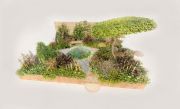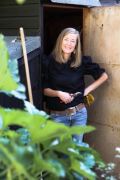The ADHD Foundation announce their ‘All About Plants’ soothing neurodiversity garden
'All About Plants’ Garden Number: RGB121
The ADHD Foundation Neurodiversity Charity, the UK’s leading charity supporting individuals with Attention Deficit Hyperactivity Disorder (ADHD) and other neurodiverse conditions affecting 1 in 5 of us, is delighted to announce they will bring a garden to the RHS Chelsea Flower Show from the 20-24th May 2025, before it travels to its final relocation at The University of Liverpool.
Sponsored by Project Giving Back, the grant-making charity that supports gardens for good causes at RHS Chelsea, ‘The ADHD Foundation Garden’ will draw a deep parallel between the rich diversity of plant life and the unique strengths of neurodiverse individuals. It aims to encourage visitors to ‘think differently about thinking differently’ and help them understand how those with a neurodiverse condition, who think differently, perceive the world through a different lens and don’t always behave as expected. Just as plants grow and adapt in unexpected ways, people with neurodivergent minds also thrive doing things differently.
The garden, designed by RHS Chelsea newcomer Katy Terry of Good Grounding Garden Design, was inspired by her own personal ADHD diagnosis in 2023. After spending time with the ADHD Foundation to understand and make sense of how she and other people who have ADHD ‘think differently’, she became passionate about designing a calm and gently stimulating outdoor environment which draws parallels with the neurodiverse mind.
The garden celebrates the beauty and diversity of plants within the All About Plants garden category at RHS Chelsea. The garden experience intends to make visitors with ADHD feel soothed and a calming sense of ‘escapism’ from an intense world. The diverse range of plant species, mirroring human diversity, aims to grow an understanding and celebrate all neurodiverse people in the UK who positively contribute to society by applying their unique talents and perspectives to everyday life.
Dr Tony Lloyd, CEO of The ADHD Foundation says," The opportunity to showcase 'The ADHD Foundation Garden' at the RHS Chelsea, which has been generously sponsored by Project Giving Back, allows our charity to challenge preconceptions and stereotypes about neurodivergent individuals. We aim to empower a change in mindset by transforming negative language—such as 'challenge' and 'limitation' - into a positive focus on individual abilities, potential, and opportunities. Our garden reflects this philosophy, celebrating diversity just as all plants are uniquely different.'"
Designer Katy Terry says, ‘My personal neurodiverse journey has just begun. It’s been fascinating to discover the aspects of my character that have led me to consider the world through a different lens. Plants and garden design have been my passion for the last twenty years, and my ‘All About Plants’ garden design for the ADHD Foundation blends my horticulture and artistic strengths. I hope my debut garden at RHS Chelsea will bring a sense of calm and relief to people who are neurodiverse as they immerse themselves in nature and encourage visitors to ‘think differently about thinking differently’ by recognising the splendid complexity of different human beings, in the same way, that trees and plants are also all individuals.”
As visitors weave through the garden’s path, they will immerse themselves in a calm yet subliminally stimulating environment without any mental demands. They can see a richly layered environment filled with unique trees, shrubs and plants that represent individuality, mirroring the number of people living in the UK with a neurodivergent condition including ADHD. Examples feature the organically shaped Carpinus betulus Swing Tree - with its curved, gravity-defying stem - and the Hydrangea petiolaris that thrives vertically without support - highlighting the garden’s theme of embracing differences and human diversity.
The experience revolves around a sculpture symbolic of a large reflection pool, inviting visitors to focus on a few key species and reflect on the calming beauty of nature. Surrounded by visually stunning plants and five delicately transparent steel-mesh hanging umbrellas that symbolise neurodiverse inclusion, the waterless pool encourages visitors to sit at a nearby bench so they can reflect and celebrate human and botanical individuality.
Garden Design Features
A diverse palette of plant choices – A luxurious colour palette inspiring a visceral human response reflects the diversity of humans in all forms reflected in the whimsical plant choices with different colours, forms, sizes and textures. Whether these peat free grown plants are adapted by humans, such as the topiary or bonsai tree, or naturally occurring, such as their environment, windswept or growing unusually, the choice of plants will encourage visitors to celebrate each of them individually, no matter their shape or colour. These plants support pollinating insects to enhance biodiversity and ecological health.
Unusual Topiary Shapes - Each one, grown from Yew, will be created in different shapes, including an Onion and an Egg, to add to the garden’s theme of diversity.
Umbrella Structures – 5 distinctive steel-mesh umbrella sculptures, created by internationally renowned sculptor David Begbie, will be suspended from the central Swing Tree. These striking umbrellas embody Begbie’s signature technique of transforming discarded and industrial materials into virtually transparent mesh sculptures. The umbrellas represent inclusivity and will provide a delicate sense of comfort and protection and resemble the charity emblem of the ADHD Foundation and their iconic ‘Neurodiversity Umbrella Project’, which is the highest profile neurodiversity celebration in the UK.
Central Reflection Pool – Dublin-based Sculptor Sasha Sykes has been commissioned to design the central focal point in the garden – a 1.8metre reflection pool. Hand-cast and made with resin and recycled resin, the size of the pool ensures that it can be seen across the garden so all visitors can admire the foraged plants and collected materials from the plant list set into the resin sculpture.
Material Choices and Recyclability
The cement-free garden embraces a simple yet versatile design, utilising recyclable materials like steel and sustainable resources such as the woven willow back panels that will be attached to square-form steel posts. The selection of durable materials promotes longevity and reduces the need for replacements, whilst the use of steel allows for adaptability, as elements can be reduced or expanded to suit different spaces. The back panels, made of woven willow, are known for their sustainability by their rapid growth, effective carbon sequestration and significant carbon offset value. Much of the materials used will be re-used in our relocation garden.
Reclaimed Natural Materials
The resting bench will be crafted from a locally sourced tree that was previously felled by AJW Studios with the words ‘Thinking Differently” engraved into the bench.
Key Plants
(A full plant list is available upon request)
Carpinus betulus Swing Tree will be a key and central part of the garden - this tree has a curved stem that almost defies gravity!
Hydrangea petiolaris are normally grown as a climber, four of these beautiful hydrangeas will grow against the back wall of the garden. To celebrate difference, a self-supporting Hydrangea petiolaris will stand proudly on its own in the front of the garden. These plants represent 1 in 5 people who are neurodivergent.
An umbellifer family of plants throughout the garden in a range of varieties and heights represent the charity's umbrella logo of neuro-inclusivity.
Fasciated species (tbc) Fasciation is a genetic mutation of a plant's growing tip, and it can visibly affect the stem, flowers, or fruits. If growing conditions are favourable this Spring, we plan to include an example of this to show differences and the individual roles they each play in the botanical world.
Clematis heracleifolia These unusual clematis are classed as herbaceous sub-shrubs as their growth is so different from the rest of the genus Clematis family, which are mostly known as climbing plants.
The Garden’s Relocation
After being showcased at the RHS Chelsea Flower Show, the garden will be transported to its permanent home at The University of Liverpool. Zoë Chapman, Head of Service, Ness Botanic Gardens at The University of Liverpool, says, “We are delighted to receive The ADHD Foundation Garden at our Liverpool campus. This dedicated outdoor space will allow us to continue supporting our neurodiverse student and staff community, offering them an outside calming environment and a sense of escapism as they immerse themselves in the biodiverse trees, shrubs and plants that beautifully reflect and celebrate their own personal neurodiversity.”


